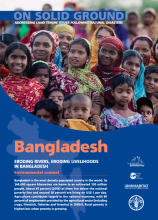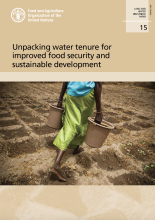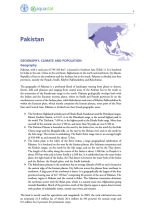/ library resources
Showing items 1 through 9 of 1019.The primary goal of the "Voluntary Guidelines for the Responsible Governance of Tenure of Land, Fisheries and Forests within the Scope of National Food Security" is to achieve food security for all and to support the progressive realization of the right to adequate food within the sco
Bangladesh is the most densely populated country in the world. Its 144,000 square kilometres are home to an estimated 150 million people. About 45 percent (2004) of them live below the national poverty line and around 36 percent are living on US$ 1 per day.
Increasing understanding of the role that secure water resources tenure plays in ensuring sustainable livelihoods, just resource governance, environmental protection, and sustainable economic development has led FAO to re-kindle the debate that had begun in 2012, when the Voluntary Guidelines on
The country profile is a summary of key information that gives an overview of the water resources and water use at the national level. It can support water-related policy and decision makers in their planning and monitoring activities as well as inform researchers, media and the general public.
This journal article discusses the importance of empowering grassroots community to facilitate the sharing of climate change and REDD+ related information, knowledge and policies discussed at the national, regional and global level to local stakeholders.
Following Copenhagen, forestry stakeholders have raised many questions about the meaning of COP15 for people, forests, and forestry. FAO and RECOFTC brought together 12 experts in Bali to debate the issues and provide answers to a dozen key questions. This report summarizes the discussions.
Over the past two years, the Food and Agriculture Organization of the United Nations (FAO) and RECOFTC – The Center for People and Forests have brought together regional experts to reflect on the outcomes of the 15th and 16th Conference of the Parties (COP) to the United Nations Framework Convent
This brief, produced jointly by FAO, UNEP and RECOFTC, outlines the ways in which forests contribute to climate change adaptation in the Asian region.
Under present and foreseeable economic and social trends in the Asia-Pacific region, can we achieve sustainable forest management and better realize the potential of forests and forestry to contribute to improved human well-being?
Paginación
Land Library Search
Through our robust search engine, you can search for any item of the over 73,000 highly curated resources in the Land Library.
If you would like to find an overview of what is possible, feel free to peruse the Search Guide.









